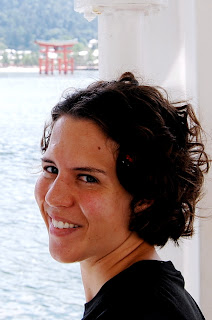
Night view of Kumamoto Castle from our guesthouse on the hillside. (Photo by Joe)
From Mt. Aso, we headed to Kumamoto, home to what is generally considered to be the finest castle in Japan after Himeji. Unlike Himeji, Kumamoto-jo is a reconstruction, since it burned in 1877 during a rebellion by samurai warriors. The castle did, however, withstand the attacks by the rebel army and "proved its worth as an impregnable castle."

The plum blossoms were beginning to bloom while we were there, sending splashes of pink and white across the muted winter landscape.


A sign on the grounds informed me that "The stone foundations with their unique sloping lines and curves and their massive impenetrability are famous throughout the nation as the 'walls that repel enemies'."
The stone walls definitely were impressive and higher than the ones we've seen at other castles. It seemed impossible to imagine scaling these behemoths.

One interesting feature of Kumomoto is the built-in slots for dropping stones or other weapons on attackers, as well as the covers that can be pulled down over the windows.


The museum inside was nicely done and well labeled in English. I particularly liked the miniature models of the castle and grounds, and this illustration showing a cross section of the castle's interior.


Besides the castle, we also paid a visit to Suizenji Jojuen Garden. The interesting aspect of this garden is that it was built to represent the 53 Stations of the Tokaido Road, the old road that linked Tokyo and Kyoto. It even has a miniature Mt. Fuji.
You can imagine what this looks like when everything turns green.
While in Kumamoto, we made a point of trying the area's specialty dishes, including some tasty garlic ramen, lotus root stuffed with spicy Japanese mustard (karashi renkon) and raw horse meat (basashi).
Yes, we ate raw horse meat. I didn't even know you could do that before moving to Japan. It made me think of the time when I was maybe 13 and I went to Florida to visit my Nana on spring break. During the visit I asked her if we could eat at McDonald's. Her disgusted response: "Ah, it's all horse meat!"

Basashi and karashi renkon
The Japanese aren't so turned off by that idea, though, and in fact the stuff is considered a delicacy, because it was a little pricey. Surprisingly, the horse meat didn't have a very strong taste of any kind. It really just reminded me of tuna sushi, but chewier. I feel like I should have felt guilty about trying this, but truthfully I did not. I just tried not to think about it.
The karashi renkon was good but that mustard was seriously spicy. It kinda makes its way up through your sinuses 'til you feel like your brain is burning. But I liked it!




